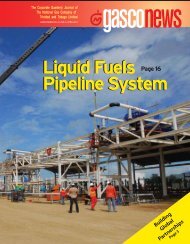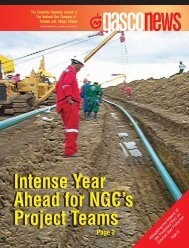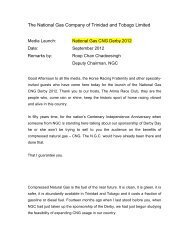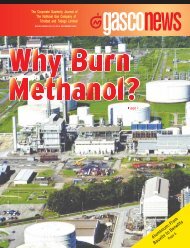June 2012 ISSN 2070-4593 - NGC
June 2012 ISSN 2070-4593 - NGC
June 2012 ISSN 2070-4593 - NGC
You also want an ePaper? Increase the reach of your titles
YUMPU automatically turns print PDFs into web optimized ePapers that Google loves.
IPCC asks Greenhouse Gas<br />
Inventories Task Force to<br />
develop guidelines<br />
Experts at the Intergovernmental Panel on<br />
Climate Change (IPCC) are to draw up new<br />
guidance to enable countries to measure the<br />
impact on greenhouse gas emissions from<br />
agriculture, forestry and changes in land use<br />
more accurately.<br />
The IPCC asked its Task Force on National<br />
Greenhouse Gas Inventories (TFI) to review<br />
and update its guidance on greenhouse gas<br />
emissions and removals from land use, land<br />
use change and forestry (LULUCF), which<br />
includes the impact of forestry, deforestation,<br />
agriculture, and the management of wetlands<br />
and peat lands, by October 2013.<br />
The decision, taken at a meeting of the<br />
IPCC’s governing body, the Panel, in Geneva<br />
on 6-9 <strong>June</strong>, was in response to an invitation<br />
by Parties to the Kyoto Protocol to the United<br />
Nations Framework Convention on Climate<br />
Change (UNFCCC). In this invitation, the<br />
Parties to the Kyoto Protocol asked the<br />
IPCC to review and if necessary revise its<br />
Good Practice Guidance on LULUCF issued<br />
in 2003 that may require changes to ensure<br />
consistency with decisions agreed by the<br />
UNFCCC in Durban at the end of 2011.<br />
All Parties to the UNFCCC are required<br />
to prepare their national inventory of<br />
anthropogenic greenhouse gas emissions<br />
and removals – emissions and removals<br />
due to human activity – including those<br />
arising from LULUCF, according to guidelines<br />
developed by the IPCC.<br />
Climate policy and global climate<br />
negotiations rely on a robust scientific<br />
foundation to produce sound results. The<br />
IPCC provides policy-makers with regular<br />
assessments of climate science and its<br />
potential impacts, as well as assessments of<br />
Dr Rajendra Pachauri,<br />
Chair of the IPCC<br />
the possibilities for mitigating climate change.<br />
The estimation of emissions and removals<br />
of greenhouse gases is one important basis<br />
for climate mitigation. The IPCC provides<br />
de facto international standards for such<br />
estimation, though highly technical work,<br />
while offering flexibility to take different<br />
national circumstances and capacities into<br />
account.<br />
“For this purpose the IPCC has developed<br />
methodologies, which must benefit from<br />
assessments using the most recent scientific<br />
literature available today on subjects<br />
including forest management, harvested<br />
wood products and wetland draining and<br />
rewetting.<br />
The required update of IPCC<br />
methodologies will provide policy-makers<br />
with the most valid guidance and practices<br />
available to report on their LULUCF emissions<br />
appropriately and as required under the<br />
second commitment period of the Kyoto<br />
Protocol,” said Dr Rajendra Pachauri, Chair<br />
of the IPCC.<br />
The decision by the Panel follows the<br />
launch in May by the Task Force of new<br />
software to enable countries to report<br />
national greenhouse gas inventories more<br />
accurately and comprehensively, in line with<br />
the latest IPCC greenhouse gas inventory<br />
guidelines updated in 2006.<br />
The UNFCCC had earlier invited the<br />
IPCC to produce supplementary guidance on<br />
wetlands, which will also be completed by<br />
October 2013.<br />
<strong>June</strong> <strong>2012</strong> Earth Conscious 35









